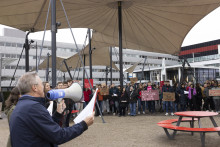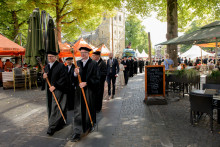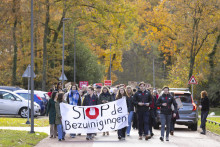The organiser of the meeting in Ravelijn 1501 was action group Twente for Protest. Now that trade unions have announced a 'relay strike' in higher education , the question was on the table: how should something like this be translated to the UT?
Upshift
After all, demonstrations on the Malieveld, in the center of Enschede and the campus took place. Trade unions have recently agreed to stop working. But in the meantime, roughly 1.3 billion euros in education cuts are still planned. As organiser Elias König put it: 'It's time to switch up gears.'
But in what form should that be done? The answer to this was not easy to formulate, as it turned out during the meeting. Inextricably linked to that question was another: how do we get enough people willing to strike? As Kees Wesselink-Schram, associated with the FNV trade union, put it: 'The signals from cities such as Leiden and Amsterdam are that they can mobilise enough people. But at more peripheral universities, that sound is less convincing.'
Protection
What a strike would entail, FNV director Sam Verduijn called in. 'Strictly speaking, it is a legal action that must be declared by a trade union. But that does not mean that you have to be a union member to be allowed to strike. Every employee can do that.' The difference is in the protection for the employee, Verduijn explained. 'An employer may withhold your wages if you strike. As a union member, you are compensated for that.'
If it were up to the national trade union, The UT community would decide for themselves how they would shape a strike, according to Verduijn. 'A strike is simply putting you on a job. But that can take all kinds of forms. We want to give every university the space to think about how they want to shape such a strike and when. After all, you also have to build a coalition.'

'Actually, we are striking against ourselves'
Whether such a broad coalition can be built at the UT, assistant professor Peter Stegmaier asked. 'No matter how sympathetic a strike, what effect does it have? If a company employee stops working, his employer cannot sell anything and loses money. If train operators strike, passengers will not be transported. If we do something, we have to do something that the government feels. We must avoid hurting ourselves.'
With ourselves, the attendees – the vast majority of whom were employees – did not mean so much themselves, but mainly the students. 'If we go on strike, we mainly affect the students. Nobody cares whether or not we write our papers,' said assistant professor Maren Behrensen with some sense of cynicism. 'We all work in the context of a system in which we exploit ourselves. So basically we are striking against ourselves. We therefore have to think carefully about the desired effects of a strike.'
That a strike can also lose sympathy, was shown five years ago in the United Kingdom, another attendee shared. 'The moment students didn't get their diplomas, it only got massive media attention. But that was a PR loss, precisely because people got the impression that students were being hit unfairly.' Still, if it is up to the recently started Enschede Student Movement, it is not a problem that students are inconvenienced. 'I'd rather have a study delay than have my favourite teachers lose their jobs', said a representative. 'You are the backbone of our university.'
White strike
Another attendee suggested holding a so-called white strike. 'What I resented about the demonstration in The Hague were the conditions set by the Executive Board about the exams that had to go ahead and catching up on work. I see many colleagues around me working overtime on a structural basis. With a white strike, we can just clock in at 8 a.m. and clock out at 5. We simply do what is expected of us, nothing more. If everyone does that, you will see that our whole system crumbles.'
There were more suggestions. From an hour's strike and taking a group photo of a massive group, to stopping administrative work to the relay strike suggested by the trade unions. Doing nothing or doing something, everything came up. But according to FNV director Verduijn, it is above all important to put the strike stamp on an action. 'That has never happened in this sector. If there is a strike, it is a serious signal to politicians.'
In what form a strike reveals itself at the UT, that remains a question for the time being. The meeting in Ravelijn may have ended, but the discussion is far from over.






